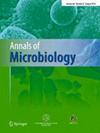降解多种等位化学酚酸的 Sphingobium sp.
IF 3.4
4区 生物学
Q2 BIOTECHNOLOGY & APPLIED MICROBIOLOGY
引用次数: 0
摘要
连作面临的挑战制约着农业的发展。限制连作的三个主要障碍是:植物等位化学物质的自毒性、土壤理化特性的恶化和微生物区系的失衡。植物提取的酚酸可导致自毒,被认为是造成连作障碍的主要因素。减少连作土壤中的酚酸可以降低酚酸的自毒性,改善连作障碍。因此,研究降解等位化学酚酸的微生物资源非常重要。因此,我们对能降解酚酸的细菌菌株 V4 进行了分离、鉴定和基因组分析。使用香草酸-矿物琼脂从草莓土壤中分离出的菌株 V4 被鉴定为革兰氏阴性短杆菌。随后的 16S rRNA 系统进化分析表明,V4 与鞘氨醇属的成员聚类。关系最密切的物种是 Sphingobium lactosutens DS20T(相似度为 99%)和 Sphingobium abikonense NBRC 16140T(相似度为 97.5%)。V4 与其他蛇尾藻成员的序列相似度也大于 95%,因此被命名为蛇尾藻 V4。生化测试表明,除了某些特性外,蛇尾藻 V4 的生化特性与其最相似的菌株相似。V4 能有效降解香草酸、阿魏酸、对香豆酸、对羟基苯甲酸和丁香酸。V4 在 30 °C、pH 值 6.0-7.0 和 0-0.05% NaCl 的条件下生长最好。在最佳条件下,500 mg/L 香草酸在 24 小时内被 V4 完全降解。全基因组分析表明,Sphingobium sp.在 V4 基因组中发现了两个参与香草酸降解的基因:染色体上的编码香草酸 O-脱甲基酶氧化还原酶 VanB 的基因和一个大质粒上的编码香草酸单加氧酶的基因。香草酸分解基因的组织结构与假单胞菌和醋酸杆菌中编码香草酸邻脱氢酶 VanA 和 VanB 亚基的基因的相邻组织结构不同。V4 可降解多种酚酸。对其特性和基因组进行了进一步分析。这项研究为进一步研究和应用这种酚酸降解微生物以缓解农业连作障碍提供了支持。本文章由计算机程序翻译,如有差异,请以英文原文为准。
Sphingobium sp. V4, a bacterium degrading multiple allelochemical phenolic acids
Continuous cropping challenges constrain the development of agriculture. Three main obstacles limit continuous cropping: autotoxicity of plant allelochemicals, deterioration of physicochemical characteristics of soil, and microflora imbalance. Plant-derived phenolic acids can cause autotoxicity, which is considered the main factor mediating continuous cropping obstacles. Reducing the phenolic acids in continuous cropping soils can decrease the autotoxicity of phenolic acids and ameliorate continuous cropping obstacles. Therefore, it is important to study the microbial resources that degrade allelochemical phenolic acids. Thus, the bacterial strain V4 that can degrade phenolic acids was isolated, identified, and genomically analyzed. Strain V4 isolated from strawberry soil using vanillic acid-mineral agar was identified as a Gram-negative short rod bacterium. Subsequent 16S rRNA phylogenetic analysis revealed that V4 clustered with members of the genus Sphingobium. The most closely related species were Sphingobium lactosutens DS20T (99% similarity) and Sphingobium abikonense NBRC 16140T (97.5% similarity). V4 also shared > 95% sequence similarity with other members of Sphingobium, so Sphingobium sp. V4 was named accordingly. Biochemical tests revealed that the biochemical characteristics of Sphingobium sp. V4 were similar to its most similar strains except for some properties. Sphingobium sp. V4 effectively degraded vanillic acid, ferulic acid, p-coumaric acid, p-hydroxybenzoic acid, and syringic acid. V4 grew best at the conditions of 30 °C, pH 6.0–7.0, and 0–0.05% NaCl. 500 mg/L vanillic acid was completely degraded by V4 within 24 h under the optimal conditions. Whole genome analysis showed that Sphingobium sp. V4 contained one chromosome and three plasmids. Two genes involved in vanillic acid degradation were found in the V4 genome: the gene encoding vanillate O-demethylase oxidoreductase VanB on the chromosome and the gene encoding vanillate monooxygenase on a large plasmid. The organization of vanillate catabolic genes differed from the adjacent organization of the genes, encoding vanillate o-demethylase VanA and VanB subunits, in Pseudomonas and Acinetobacter. The isolated bacterium Sphingobium sp. V4 degraded multiple phenolic acids. Its properties and genome were further analyzed. The study provides support for further investigation and application of this phenolic acid-degrading microorganism to alleviate continuous cropping obstacles in agriculture.
求助全文
通过发布文献求助,成功后即可免费获取论文全文。
去求助
来源期刊

Annals of Microbiology
生物-生物工程与应用微生物
CiteScore
6.40
自引率
0.00%
发文量
41
审稿时长
3.2 months
期刊介绍:
Annals of Microbiology covers these fields of fundamental and applied microbiology:
general, environmental, food, agricultural, industrial, ecology, soil, water, air and biodeterioration.
The journal’s scope does not include medical microbiology or phytopathological microbiology.
Papers reporting work on bacteria, fungi, microalgae, and bacteriophages are welcome.
Annals of Microbiology publishes Review Articles, Original Articles, Short Communications, and Editorials.
Originally founded as Annali Di Microbiologia Ed Enzimologia in 1940, Annals of Microbiology is an official journal of the University of Milan.
 求助内容:
求助内容: 应助结果提醒方式:
应助结果提醒方式:


